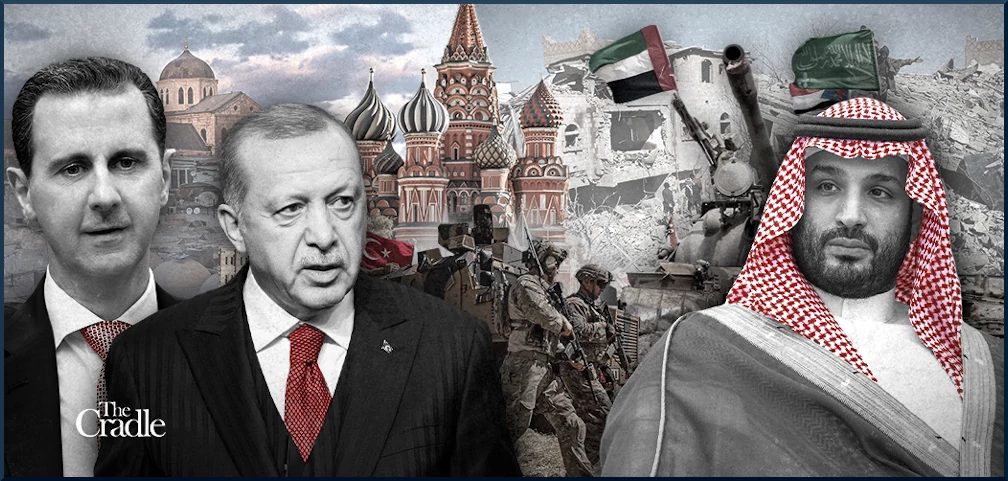by Hassan Illiak, published on The Cradle, April 4, 2023
The mid-March Moscow summit between Syrian President Bashar al-Assad and his Russian counterpart Vladimir Putin was notable for being publicized in advance. Since the outbreak of the Syrian war, Assad’s foreign visits have not been publicly revealed until after they have occurred. This small but significant detail suggests the Syrian president has a newfound confidence in the political and security conditions outside his national borders.
While the participants kept a tight lid on leaks, informed sources from both Moscow and Damascus disclosed to The Cradle that the Syrian and Russian presidents discussed the following issues:
Economic ties: With a focus on Syria’s energy sector, Putin expressed Russia’s readiness to invest in the production of electricity in the Levantine state, which post-conflict, suffers from a 75 percent deficit in production. Putin also expressed Moscow’s willingness to help Syria meet its vital grain needs.
Relations with Turkiye: While in Moscow, Assad reportedly refused to hold a four-way meeting between the deputy foreign ministers of Syria, Turkiye, Russia, and Iran. The Syrian president reiterated that Turkiye occupies Syrian lands, and negotiations between the two countries cannot advance from the security to the political level without a clear and public pledge from Turkish President Recep Tayyip Erdogan to withdraw his military forces from the occupied territories, and open the main roads linking Syrian provinces – particularly the Latakia-Aleppo road, known as the M4 highway.
However, Moscow pressed its case, and reportedly reached an agreement between Damascus and Ankara stipulating that their negotiations would continue and move to the political level, with the main item on the table being Turkish withdrawal from Syrian lands. The basis for a much-awaited summit between Assad and Erdogan will be discussed at a later date.
The sources say that, for domestic political purposes, Erdogan needs to meet Assad before Turkiye’s May presidential elections, to convey to voters that he seeks to stop the war at his country’s southern borders, intends to repatriate the approximately three million Syrian refugees back home – a hot topic for voters – and to assure the Turkish Alevi electorate that he is not hostile to their sect, to which his rival Kemal Kilicdaroglu belongs.
Relations with Saudi Arabia: Putin, who has been leading the mediation efforts to normalize Saudi-Syrian relations, briefed Assad on the results of his talks with Saudi Crown Prince Mohammed bin Salman (MbS). According to official sources in Damascus and Moscow, Putin’s initiative has made progress in reactivating critical communication between Damascus and Riyadh.
Saudi Arabia’s strategic shifts
On 23 March, 2023, the Saudi Ministry of Foreign Affairs announced the start of talks with Syria to reactivate consular work, which is a prelude to the return of normal diplomatic relations between the two countries, as reported by Saudi daily Al-Sharq Al-Awsat.
Sources speaking to The Cradle have confirmed that any potential progress in Syrian-Saudi relations are the result of these Russian mediation efforts, and are unrelated to the game-changing Saudi-Iran agreement struck in Beijing on 10 March. The sources believe that a meeting between Riyadh and Damascus may occur after the end of the month of Ramadan.
While the success of Saudi-Iran negotiations under Chinese auspices, and the potential breakthrough in Saudi-Syria relations under Russian sponsorship, suggest a strategic eastward turn for the kingdom, sources close to Riyadh emphasize that there is no change in the Saudi-US relationship.
While Riyadh’s relations with Washington have experienced declines in the past, recent shifts in the global political, economic, and military landscapes have prompted MbS to diversify his country’s partnerships, while preserving the strategic alignment with Washington.
Yemen: Riyadh’s regional albatross
Today, the Saudi crown price is pursuing a “zero problems” policy with neighboring countries. After failing to “transfer the [regional] battle into Iran,” and after his war on Yemen transformed Yemeni Resistance movement Ansarallah from a small organization into a regional force, MbS has realized that his domestic economic, financial, and entertainment mega-projects are doomed without ensuring calm on the kingdom’s borders.
Therefore, since late 2022, he began earnest negotiations with Iran, responded assertively to Russian efforts to mediate with Syria, and began direct talks with Ansarallah in their Sanaa stronghold. The discussions reportedly made significant progress, then stalled in January over several key points, including Riyadh’s “inability” (or unwillingness) to lift the siege on Yemen, the withdrawal of foreign forces from the country, and agreement over an internal political solution to the Yemeni crisis.
As things stand, Riyadh claims that it “cannot force its partners” in the aggression – the UAE and US, in particular – to withdraw their forces from Yemeni territory.
Several Ansarallah allies have assessed that the Saudis want to end the war, but have been prevented from doing so by the US, UK, UAE, and France. However, this estimate changed after Saudi Arabia retracted a number of the pledges it made in the negotiations.
After initially ceasing restrictions on the port of Hodeidah, the UN has returned to obstructing the arrival of some ships to the port. The siege renewal coincided with a visit by US Ambassador to Yemen Stephen Fagin to the UN Verification and Inspection Mechanism (UNVIM) personnel in Djibouti which is tasked with inspecting ships bound for Hodeidah.
In a renewed escalation of tensions, Ansarallah threatened to expel the UN mission in Sanaa within 72 hours if a container ship seized by inspectors in Djibouti was not released. Indeed, before the deadline expired, the UN released the ship.
Although the threat coincided with the US ambassador’s provocative visit, and while it appears that the Americans were trying to undermine the Saudi-Ansarallah understandings, Yemeni sources tell The Cradle that the obstruction of the ships was not exclusively a US decision, but also a Saudi one.
Furthermore, the UN explicitly informed the Sanaa government that the detention of ships proven to be weapons-free was carried out by a decision of the “coalition leadership” – that is, from the Saudis.
So what is Riyadh up to, and who is really obstructing a final solution to the war in Yemen? Is it the Saudis or the Americans?
Sources close to the Sanaa government say that “a comprehensive US-Saudi consensus” still exists over Yemen. The two allies may differ sometimes, but until now, they say:
“Washington and Riyadh still agree on calming things down in Yemen, while keeping the blockade in place. They also agree that Yemen should not be an independent and strong country, capable of controlling its resources or exploiting its geographical location, because that entails strategic risks for Saudi Arabia’s regional role, and for US and Israeli interests in West Asia, the Horn of Africa, and the Red Sea.”
The sources add: “Saudi Arabia and America cannot afford to grant Ansarallah conditions that would enable it to accumulate additional strength and a larger and more effective arsenal.” Simply put, the duo are not seeking an actual end to the war, but are instead pursuing a drawn-out truce.
MbS wants some calm to ensure that missiles and drones do not rain down on his ambitious entertainment and development projects, while the US and the UAE want to keep Yemen fragmented, persist in the theft of its vital oil resource, and at the same time, hold Ansarallah (in northern Yemen) responsible for managing a country that continues to buckle under siege.
Truces, not peace – yet
In short, from Yemen in the south, to Iran in the east, and Syria, Iraq and Turkey in the north, West Asia has entered the post-Arab Spring phase, where once-battling neighbors are seeking to reconnect.
This is a phase governed by ‘armistice agreements’ between countries that have fought each other, directly or via proxies, for more than a decade. Armistice agreements, it should be noted, are not peace treaties, and what this suggests is the continuation of the US-style legacy of “managing conflict,” and never actually ending it.
As multipolarism beckons the world around, it is yet to be seen if Chinese and Russian efforts to stabilize the region in order to advance sweeping connectivity, economic, and development projects will be able to overcome the old “conflict management” and “forever wars” paradigm of the declining unipolar order.
 Syria Support Movement solidarity with the Syrian people
Syria Support Movement solidarity with the Syrian people





